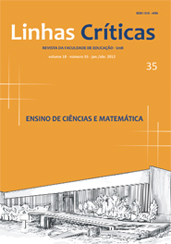Viagens pelo campo virtual: aprendendo além dos muros da sala de aula
DOI:
https://doi.org/10.26512/lc.v18i35.3838Palavras-chave:
Viagem de campo virtual, Leitura, EscritaResumo
Este artigo fornece uma visão geral acerca de uma abordagem holística destinada aenvolver os alunos em processos de leitura e escrita, enquanto envolvidos com umtema científico. Recentes avanços no campo da tecnologia e do acesso à Internetabriram uma infinidade de recursos nunca antes disponíveis para professores ealunos. Muitos destes, incluindo viagens de campo virtual, podem ser usados paraestimular o interesse e motivar os alunos a selecionarem os seus próprios tópicosde interesse e orientarem pesquisas, leituras e aprendizagens (Scott, 2007). Esteartigo apresenta um relato sobre a exploração e o uso de viagens de campo virtuaiscomo uma forma de envolver os alunos em atividades de pesquisa, escrita ecompartilhamento de conhecimentos, em desenvolvimento, sobre o ciclo de vida deáguias. O local de nidificação das águias em Decorah, Iowa, forneceu o local para aviagem de campo virtual que está sendo relatado.
Downloads
Referências
AKERSON, Valarie; YOUNG, Terrell. Science the “write” way. Science & Children. Arlington VA, v. 43,n. 3, p. 38-41, nov./dez. 2005.
BOGDAN, Robert; BIKLEN, Sari. Qualitative research for education: An introduction to theories andmethods (4aEd.). Toronto: Allyn and Bacon, 2003.
CRESWELL, John. Qualitative inquiry and research design: Choosing among five traditions. ThousandOaks: Sage Publications, 1998.
EMPSON, Rip. Nearing 100 million views, decorah eagles become the most watched live stream ever.(n.d.). Disponível em <http://techcrunch.com/2011/05/12/nearing-100-million-views-decorah-eagles-become-the-most-watched-live-stream-ever/>. Acesso em: 15 setembro de 2011.
FELDMAN, Dara. Technology and early literacy: A recipe for success. 2002. Disponível em. Acesso em: 15 setembrode 2011.
FULTON, Kathleen. Learning in a digital age: Insights into the issues. Technological Horizons InEducation. Irvine, n. 25, p.14-41, 1998.
GUTHRIE, Larry F.; RICHARDSON, Susan. Language arts: Computer literacy in the primary grades.Educational Leadership. Alexandria, v. 53, n. 2, p. 14-17, 1995.
GARDNER, Howard. Multiple intelligences: New horizons. New York: Basic Books, 2006.
HODSON, Derek. Science curriculum development: Lessons from the past. In: DEREK. Hodson;BENCZE, John Lawrence; PEDRETTI, Erminia; NYHOF-YOUNG, Joyce (Eds.) Changing scienceeducation through action research: Some experiences from the field. Toronto: Imperial Oil Centre forStudies in Science, Mathematics and Technology Education; Ontario Institute for Studies in Education,University of Toronto, 2001, p. 25-43.
KILBOURN, Brent. For the love of teaching. London: The Althouse Press, 2000.
KLEMM, Barbara; TUTHILL, Gail. Virtual field trips: Best practices. International Journal of InstructionalMedia. Tolland, v. 30, n. 2, p. 177-193, 2002.
LINCOLN, Yvonna; GUBA, Egon. Paradigmatic Controversies, Contradictions, and Emerging Confluences.In: DENZIN, Norman; LINCOLN, Yvonna (Eds.). Handbook of Qualitative Research. Thousand Oaks:Sage, 2000, p.163-188.
MERTLER, Craig. Action research: Teachers as researchers in the classroom. Thousand Oaks: SagePublications, 2006.
ONTARIO MINISTRY OF EDUCATION AND TRAINING. The Ontario curriculum, Grades 1-8: socialstudies. Toronto, On: Queen’s Printer for Ontario, 1998.
PARR, Michann; CAMPBELL, Terry. Teaching the language arts. Mississauga, On: John Wiley & Sons,Ltd, 2012.
PEDRETTI, Erminia. Facilitating action research in science, technology and society (STS) education:an experience in reflective practice. Educational Action Research. Routledge, v. 9, n. 3, p. 307-327,1996.
PEDRETTI, Erminia. Action research in science-technology-society education: The road less traveled(Unpublished doctoral thesis). Ontario Institute for Studies in Education, University of Toronto, Toronto,Canada, 1994.
RISINGER, C. Frederick. Using online field trips and tours in social studies. Social Education, 74(3),2010. 137-138.
SCOTT, Jeff. Exploring the use of virtual field trips with elementary school teachers:A collaborativeaction research approach (Unpublished doctoral thesis). Ontario Institute for Studies in Education,University of Toronto, Toronto, Canada, 2007.
STAKE, Robert. E. Case Studies. In: DENZIN, Norman; LINCOLN, Yvonna. (Eds.), Handbook ofqualitative research(2ndEd). London: Sage Publishing, 2005, p. 236-247.
STANDEN, Andrew. Grounded. Edutopia, October, 2005, p. 34-39.
STRICKLAND, Dorothy S.; GANSKE, Kathy; MONROE, Joanne K. Supporting struggling readers andwriters: Strategies for classroom intervention. Portland: Stenhouse Publishing, 2006.
UNDERWOOD, Jean. A comparison of two types or computer support for reading development. Journalof Research in Reading. Coventry, v. 23, n. 2, p.136-148, 2000.
VETO, Dori. Motivating reluctant adolescent readers. The School Administrator. Alexandria, v. 63, n.4, p. 31-34, 2006.
ZANETIS, Jan. The beginner’s guide to interactive virtual field trips. Learning & Leading with Technology.Eugene, v. 37, n. 6, p. 20-24, 2010.
Downloads
Publicado
Como Citar
Edição
Seção
Licença
Copyright (c) 2016 Linhas Críticas

Este trabalho está licenciado sob uma licença Creative Commons Attribution 4.0 International License.
Autores que publicam nesta revista concordam com os seguintes termos:
- Autores mantém os direitos autorais e concedem à revista o direito de primeira publicação, sendo o trabalho simultaneamente licenciado sob a Creative Commons Attribution License, o que permite o compartilhamento do trabalho com reconhecimento da autoria do trabalho e publicação inicial nesta revista.
- Autores têm autorização para assumir contratos adicionais separadamente, para distribuição não-exclusiva da versão do trabalho publicada nesta revista (ex.: publicar em repositório institucional ou como capítulo de livro), com reconhecimento de autoria e publicação inicial nesta revista.
- Autores têm permissão e são estimulados a publicar e distribuir seu trabalho online (ex.: em repositórios institucionais ou na sua página pessoal) a qualquer ponto antes ou durante o processo editorial, já que isso pode gerar alterações produtivas, bem como aumentar o impacto e a citação do trabalho publicado.



